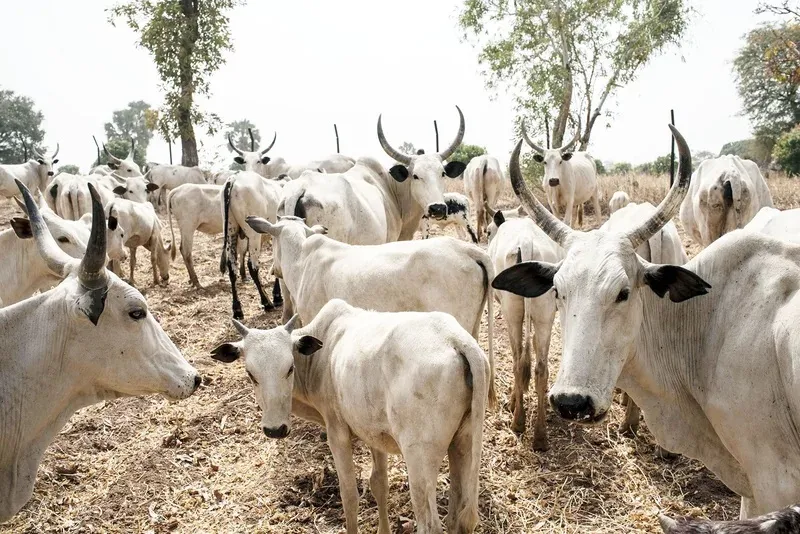By Isaac Atunlute
Nigeria’s livestock industry, a livelihood for millions of families, faces a crisis that threatens both livelihoods and national food security.
Agramondis Research and Consulting estimated that worsening insecurity is stripping the economy of up to ₦7.17 trillion annually and has already lost roughly 40% of the country’s herd of cattle, goats, and sheep.
Behind those numbers are herders forced off grazing routes by armed attacks, farmers counting the losses from stolen or dead animals, and markets where meat and milk prices keep rising beyond the reach of many families.
The industry is massive—over 400 million animals across the country, including 20.9 million cattle, 49.1 million goats, and 88.2 million sheep.
Beyond that, it accounts for a tenth of agricultural GDP, it is also the primary protein source for millions and directly employs 4.5 million people.
But the pressure of climate, declining pasture for grazing, weak disease control, and poor data are increasing the security risk.
Variable rain, rising temperatures, and drought have reduced the volume of pasture, conflict and theft of cattle by farmers and herders have heightened the risks of livestock movement. Heat stress in itself can reduce production by 15% each year, a financial blow of nearly a trillion in naira.
But back here in the homeland, farmers are taking up the challenge to keep the industry alive. Nigeria’s Animal Identification and Traceability System, or NAITS is rolling out ear tags, cattle passports, and digital tracking tools to improve livestock traceability and combat rustling
Elsewhere, industry stakeholders are exploring new partnerships to secure safe grazing and manage production risk.
The National Association of Cattle Dealers, Processors and Marketers of Nigeria is in talks with the Nigerian Army to lease secure military land for commercial cattle farming. Using these well-protected areas could reduce vulnerability to rustlers and signal stability to investors.
Meanwhile, the military itself continues to play a direct role in combating livestock crime.
In Taraba State, troops operating under Operation Golden Peace intercepted stolen livestock and arrested operators of a cattle-rustling syndicate.
This timely intervention not only halted further losses. It also sent a strong message — such operations can reclaim stolen property and deter future crimes.
These emerging solutions are encouraging, but scaling them matters most. For example, if NAITS were implemented nationwide and linked to digital insurance platforms, farmers could claim compensation when theft occurs.
Similarly, if the partnership with the Nigerian pans out right, offering secure grazing hubs, it could help protect herders and catalyse local meat production, easing longstanding herder-farmer conflicts.
Smallholder herders also need cost-effective tools on the ground. Mobile alert systems and community watch groups powered can signal movement of herds near farms before issues escalate.
Low-cost water storage and drought-resistant fodder can improve herd health, making livestock less likely to wander in search of resources.
Meanwhile, data from NAITS linked with mobile platforms could help vets deliver quicker care and provide insurance payouts when disease or theft happens.
Turning things around requires multi-layered strategies—tighter security, digital tracking, secure grazing zones, and better animal husbandry.
Spreading these successes could help turn Nigeria’s livestock losses into lasting gains.
Nigeria's livestock industry, crucial for millions of livelihoods and national food security, faces a severe crisis with economic losses due to insecurity estimated at ₦7.17 trillion annually. The country has lost about 40% of its cattle, goat, and sheep populations. Multiple factors exacerbate the situation, including climate changes leading to reduced grazing, weak disease control, and rising theft risks. In response, initiatives like Nigeria’s Animal Identification and Traceability System (NAITS) are introducing ear tags and digital tracking to curb rustling and improve traceability.
Efforts to stabilize the industry include the National Association of Cattle Dealers collaborating with the Nigerian Army to lease secure military land for grazing, reducing vulnerability to theft. Military interventions, like Operation Golden Peace in Taraba State, have also helped by intercepting stolen livestock. Scaling these solutions, such as linking NAITS to digital insurance, could provide compensation for theft.
Additional strategies are essential, like mobile alert systems to prevent conflict, improving herd health with drought-resistant fodder, and using data for better veterinary care. Overall, the successful implementation of layered security measures and better animal husbandry may convert Nigeria’s livestock challenges into sustainable growth and stability.






